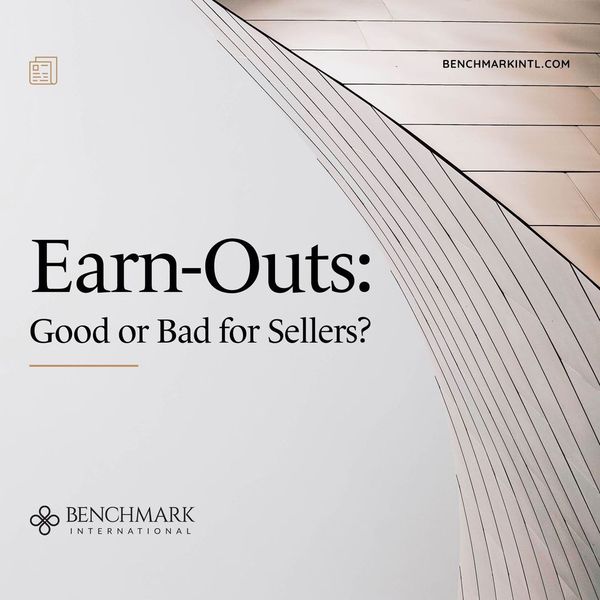James Robinson, Senior Director in our Manchester Transactions Team, has drawn from his wealth of completed deals to give a balanced view.
Q: What is an earn-out?
A: By using an earn-out, a buyer makes part of the agreed deal value payable on the achievement of pre-agreed financial targets. Earn-outs can be a great mechanism to bridge the gap between the seller’s and buyer’s valuations. A buyer might say, for example, 'we will pay you the price you are seeking provided the business performs at a higher level'.
Q: Are earn-out payments dependent on future profits?
A: Yes, but not always. As future earnings may be less clear-cut than previously where the business falls into a new group structure, earn-outs are sometimes benchmarked against future annual turnover or gross profits. Care needs to be taken that any targets are simple and clearly understood by both parties.
Q: How do I decide whether to accept an earn-out?
A: You’ve heard the adage, ‘a bird in the hand is worth two in the bush’? So that’s the answer in a nutshell. If you believe the proposed targets and timeline will work, particularly with the support and synergies a new owner might bring, you may well be inclined to take the higher number. As with all aspects of any deal, sellers will need to look at the structure of a deal ‘in the round’ before assessing its acceptability. Deciding whether the earn-out is the ‘icing on the cake’ or fundamental to the achievement of the right payout.
Q: What are the risks associated with an earn-out?
A: Two of the main risks include whether the targets will be achieved and a degree of credit risk on the buyer. Additionally, you will need to consider the level of trust you have for the buyer and your ability to work together for the period of any earn-out.
Q: How does an earn-out differ from deferred consideration?
A: With an earn-out, a portion of the purchase price is paid over time based on clear financial targets, which is why it is often referred to as contingent consideration. With deferred consideration, often delivered by a mechanism referred to as ‘loan notes’, fixed sums will be paid over time that are not dependent on financial targets. Although, in some cases they may be dependent on, say, the maintenance of profits or the sellers staying with the business for an agreed period.
Q: Does an earn-out imply the buyer lacks funding?
A: Not necessarily, but even if funding constraints play a role, it's not always a negative reflection on the buyer; it's part of deal structuring.
Q: Will the buyer use the cash from future profits to pay the earn-out?
A: Yes, that’s generally the case, so buyer and funding assurance is crucial. Financial forecasts can often be used to gauge and assess earn-out targets and achievability although financial forecasts are, by their very nature, conjectural, and no amount of discussion and analysis can provide 100 per cent certainty.
Q: How will my advisers negotiate the proposal?
A: An earn-out proposal will likely be evaluated by your advisers – accountants, tax advisers, lawyers and lead advisers – as a team, so the assessment can become quite complex. The team will need to look at the likely future performance of the business (either at a high level or more detailed level through the use of financial forecasts) and at the earn-out proposal itself (assessing the nature and quantum of targets and any mechanisms to avoid cliff edges etc.).
Q: What is the tax treatment for earn-outs in the UK?
A: Tax advice is normally recommended to ensure earn-out payments are treated as capital and not income, as capital rates in the UK are presently significantly lower than income tax rates. This can become complex, especially where sellers are continuing to work within the business or where it is proposed different sellers receive deal payments in a structure that does not strictly mirror the shareholdings.
Q: Do I need an experienced corporate lawyer?
A: Absolutely. A corporate lawyer ensures your interests are protected in legal documentation, negotiating what are referred to as ‘earn-out protections’ and ‘ring-fence agreements’.
Q: Can I exit the company before the end of the earn-out period?
A: Potentially, but a skilled corporate lawyer is essential to protect your legal standing and earn-out considerations. The negotiation of ‘good’ and ‘bad’ leaver provisions can be complex.
In conclusion, every deal is unique, and your deal team will guide you through the intricacies of deal structures and earn-out terms, equipping you with the information and tools to make an informed decision.

Author
James Robinson
Senior Director
Benchmark International
T: +44 (0) 161 359 4400
E: robinson@benchmarkintl.com
Europe: Michael Lawrie at +44 (0) 161 359 4400 / Lawrie@BenchmarkIntl.com
Americas: Sam Smoot at +1 (813) 898 2350 / Smoot@BenchmarkIntl.com
Africa: Anthony McCardle at +27 21 300 2055 / McCardle@BenchmarkIntl.com
ABOUT BENCHMARK INTERNATIONAL:
Benchmark International is a global M&A firm that provides business owners with creative, value-maximizing solutions for growing and exiting their businesses. Benchmark International has handled over $10 billion in transaction value across various industries from offices across the world. With decades of M&A experience, Benchmark International’s transaction teams have assisted business owners with achieving their objectives and ensuring the continued growth of their businesses. The firm has also been named the Investment Banking Firm of the Year by The M&A Advisor and the Global M&A Network as well as the #1 Sell-side Exclusive M&A Advisor in the World by Pitchbook’s Global League Tables.
Categories
Get These Insights Delivered Directly To Your Email
Explore our curated collection today and stay ahead of the curve in M&A.
